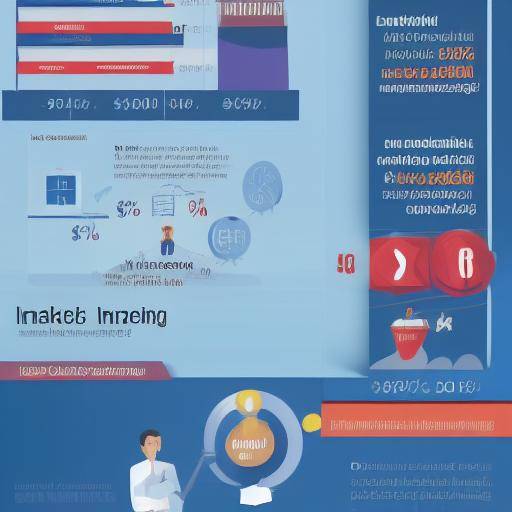
In the digital era, marketing and advertising play a crucial role in the formation of smart consumption decisions. From influence on consumer preferences to control over brand perception, these strategies significantly impact on market behavior. This article offers a thorough exploration of how marketing and advertising influence, direct decisions and contribute to the control of smart consumption. From its history to future trends, we will analyze in detail its impact and provide practical advice, industry perspectives and case studies for a complete understanding.
Introduction
In a highly connected society, the impact of marketing and advertising on smart consumption is undeniable. From the way consumers make purchase decisions to the perception they have about products and services, marketing and advertising play a key role. This article will explore in detail how these strategies influence smart consumption decisions and how brands exercise control through them. From historical analysis to future trends, this article will provide a profound and comprehensive view of this topic of current relevance.
History and Background
The impact of marketing and advertising on intelligent consumption has deep roots that go back to the industrial era. In the beginning, these practices focused mainly on the promotion of products through printed advertisements and billboards. However, with the advent of radio and television, marketing and advertising acquired a massive scope.
Over the years, various companies have used advertising strategies to influence consumer decisions. For example, Nike's "Just Do It" campaign not only positioned the brand as a symbol of determination, but also influenced consumer perceptions of performance and quality. These historical examples emphasize how marketing and advertising have been used to influence and control smart consumption decisions over time.
Development and major milestones
The development of marketing and advertising has been marked by several milestones. One of the key moments was the digital revolution, which allowed brands to reach consumers through online platforms. This revolutionized the way advertising and marketing is done, allowing a higher level of customization and segmentation.
Furthermore, the arrival of social networks has provided brands with a mechanism to directly influence smart consumption decisions. Viral campaigns and influencers marketing have changed the way brands connect with their audiences, thus redefining the role of marketing and advertising in smart consumption.
Analysis in Deep
Marketing and advertising have a significant influence on consumer behavior. Strategies such as neuromarketing have shown how emotions and instincts play a central role in purchasing decisions. Advertising campaigns have been meticulously designed to activate emotional responses that boost smart purchasing.
In addition, digital marketing has allowed brands to influence smart consumption decisions through customization and accurate segmentation. Through data analysis, companies can better understand their customers' preferences and adapt their marketing and advertising strategies to directly influence their purchasing decisions.
Comprehensive review
Marketing and advertising strategies have evolved to adapt to a changing environment. On the one hand, brands seek to influence smart consumption decisions through the inclusion of values such as sustainability and social responsibility. On the other hand, control over the brand narrative has become a primary objective, as companies seek to maintain a positive image in the minds of consumers.
In this context, storytelling has become a powerful tool, allowing brands to influence consumer perceptions and strengthen their control over brand narrative. Content strategies have become a key tool to influence smart consumption decisions, as brands seek to create an emotional connection with their audience.
Comparative analysis
When analyzing influence, decisions and control in smart consumption, it is important to understand how these three areas intertwine. Influence is exercised through marketing and advertising strategies that seek to affect consumer decisions. In turn, smart consumption decisions are closely linked to the control that brands exert over their perception and narrative that they build around their products and services.
Strategies that seek to influence, direct decisions and exercise control are intertwined in a complex fabric that defines market behavior. By understanding this interrelationship, companies can design more effective marketing and advertising strategies that positively impact smart consumption.
Practical Tips and Accessible Recommendations
In the light of these analyses, it is essential that companies adopt ethical and responsible approaches in their marketing and advertising strategies. Transparency and authenticity have become imperative, as consumers look for brands that reflect their values and principles. Incorporating sustainable and socially responsible practices in marketing and advertising strategies will not only positively influence smart consumption decisions, but will also strengthen positive control over brand perception.
In addition, companies can use the power of meaningful and authentic content to influence smart consumption decisions. Real and relevant storytelling can emotionally connect with consumers, influence their purchasing decisions and strengthen control over brand perception.
Industry Perspectives and Expert Reviews
According to industry experts, the future of marketing and advertising will focus on personalization and emotional connection. Brands will seek to influence smart consumption decisions through personalized experiences that resonate with their audiences. In addition, the use of emerging technologies, such as artificial intelligence and increased reality, will provide new opportunities to influence purchasing decisions and strengthen control over brand narrative.
Case Studies and Real Life Applications
The effectiveness of marketing and advertising influencing smart consumption decisions is illustrated in numerous case studies. For example, Coca-Cola's "Share a Coke" campaign managed to influence purchasing decisions by customizing bottles with people's names, thus fostering emotional connection with consumers.
Future Trends and Predictions
The future of marketing and advertising promises new innovations that will continue to influence, direct decisions and exercise control over smart consumption. With the advancement of artificial intelligence and data collection, customization strategies will reach unprecedented levels, allowing brands to more effectively influence purchasing decisions.
Conclusion
Marketing and advertising continue to play a key role in the formation of intelligent consumption. Their ability to influence, direct decisions and exercise control over the perception of brands positions them as powerful tools in the current business landscape. By understanding their impact and embracing ethical and sustainable approaches, companies can use these strategies to positively influence smart consumption decisions and strengthen their control over brand narrative.
Thus, marketing and advertising not only shape the current picture of smart consumption, but also offer a look at the future of the market. By adopting responsible and consumer-centred approaches, brands can leverage the impact of marketing and advertising to boost smart consumption significantly.
FAQs
What is the difference between influence and control in the context of marketing and advertising?
In the context of marketing and advertising, the influence refers to the ability of marketing and advertising strategies to affect consumer decisions and preferences. On the other hand, control refers to the power of brands to shape the perception that consumers have of them and their products.
How can brands exercise positive control over consumer perception through marketing and advertising?
Brands can exercise positive control over consumer perception through marketing and advertising by adopting transparent, ethical and sustainable approaches. Consistency in brand narrative, authenticity and social responsibility are key elements for strengthening positive control over brand perception.
What is the role of the brand narrative in the context of intelligent consumption?
The brand narrative plays a fundamental role in the context of intelligent consumption, as it influences the perception that consumers have of the brand and its products. A solid and coherent narrative can influence purchasing decisions and strengthen brand control over your image and reputation.
How can brands use storytelling to effectively influence smart consumption decisions?
Brands can effectively use storytelling by highlighting their values, principles and emotional connection with consumers. By telling authentic and relevant stories, brands can influence purchasing decisions and strengthen their control over brand perception.
What are future trends in marketing and advertising that could impact smart consumption?
Future trends in marketing and advertising include a greater focus on customization, the use of emerging technologies such as artificial intelligence to boost accurate targeting strategies, and the emphasis on emotional connection with consumers through personalized experiences.
How can companies adopt ethical and sustainable approaches in their marketing and advertising strategies?
Businesses can adopt ethical and sustainable approaches in their marketing and advertising strategies by prioritizing transparency, authenticity and social responsibility. The incorporation of sustainable practices and the promotion of ethical values can positively influence smart consumption decisions and strengthen control over brand perception.
Conclusion
Marketing and advertising exert a significant influence on consumer decision-making and on the perception of brands. By understanding their impact and adopting ethical approaches, companies can use these tools not only to influence smart consumption decisions, but also to strengthen their control over brand narrative. With a consumer-centred approach and social responsibility, marketing and advertising can boost smart consumption that benefits both businesses and consumers.






















































